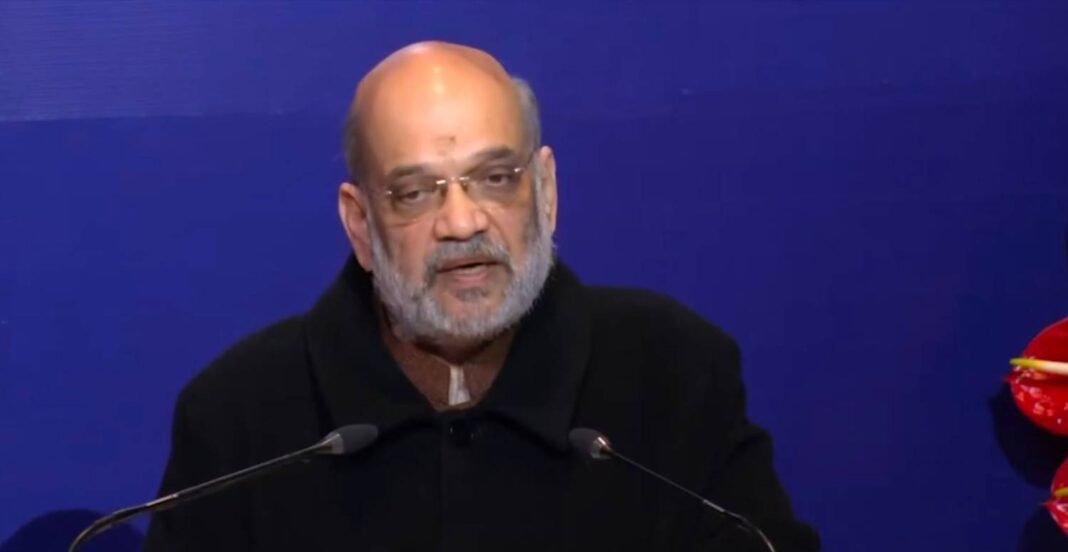Union Home Minister and Minister of Cooperation, Amit Shah, on Tuesday inaugurated the BHARATPOL portal designed by the Central Bureau of Investigation (CBI) at Bharat Mandapam in New Delhi.
Amit Shah also awarded police medals to 35 award-winning CBI officers, who were honored with the President’s Police Medal for Distinguished Service and the Home Minister’s Medal for Excellence in Investigation. The event is attended by several dignitaries, including the Union Home Secretary, the Director of CBI, and the Secretary of DoPT.
Shah, in his address, said that the central government under the leadership of PM Modi has introduced the provision of trial in absentia in the three new criminal laws, enabling the prosecution of fugitive criminals even in their absence through court orders while affirming a fair judicial process.
He further elaborated that this provision will simplify the process of extraditing detained criminals from foreign countries to India. Shah highlighted, “combined with the capabilities of the BHARATPOL portal, this new measure will empower Indian law enforcement agencies to bring fugitives to justice, no matter where they hide.”
He advised the Central Bureau of Investigation (CBI) to take the lead in implementing BHARATPOL and ensuring its widespread training at the grassroots level. He pointed out that this will strengthen the judicial system, enhance transparency, and improve the overall efficiency and effectiveness of law enforcement efforts.
At his address, Shah stated that under the leadership of PM Narendra Modi, India is stepping into a new era in international investigation with the launch of BHARATPOL. He mentioned that through BHARATPOL, every agency and police force in India will be able to seamlessly connect with INTERPOL, thereby speeding investigations.
Shah further elaborated on the five key modules of BHARATPOL Portal Will Enhance Law Enforcement’s Ability To Apprehend Fugitives: Amit Shah Connect, INTERPOL Notices, References, Broadcast, and Resources that provide a technological platform to support all our law enforcement agencies. He explained that through Connect, all our law enforcement agencies will essentially function as an extension of INTERPOL’s National Central Bureau (NCB-New Delhi).
He added that the system will ensure quick, secure, and structured transmission of requests for INTERPOL notices, enabling a scientific mechanism to swiftly locate criminals from India and across the globe, within India. Shah highlighted that the INTERPOL references from 195 countries will make it much simpler to seek and provide international assistance for investigations abroad.
He mentioned that requests for assistance from 195 countries will now be immediately available through the Broadcast module, while the Resources module will facilitate the exchange and management of documents and capacity-building initiatives.
Union Home Minister stated, “the portal’s key feature a real-time interface that will enable error-free and effective communication among agencies to enhance crime control measures.”
He further added that “this portal will significantly expedite responses to domestic and international requests for real-time data sharing, including the issuance of Red Corner Notices and other alerts through a global network.”
He noted that, for years, criminals committing crimes in India and fleeing to other countries have evaded the reach of Indian laws.
However, with the implementation of modern systems like BHARATPOL, such criminals can now be brought within the ambit of justice. He also highlighted the transformative potential of the new laws in addressing crimes such as drug trafficking, arms smuggling, human trafficking, and cross-border terrorism.
Shah further stressed the importance of raising awareness among law enforcement agencies about INTERPOL notices and institutionalizing this system. He pointed out that one of the key benefits will be the access to 19 types of INTERPOL databases, enabling young officers to analyze data, develop crime prevention strategies, and apprehend criminals more effectively.
As the National Central Bureau for INTERPOL in India (NCB-New Delhi), the CBI plays a pivotal role in facilitating international cooperation on criminal cases in collaboration with various law enforcement agencies across the country.
This coordination extends across the central, state, and Union Territory levels and is managed through INTERPOL Liaison Officers (ILOs). These ILOs work in conjunction with Unit Officers (UOs), who typically hold positions such as superintendents of police, police commissioners, or branch chiefs within their respective organizations. Currently, communication between the CBI, ILOs, and UOs is primarily conducted through traditional methods, including letters, emails, and faxes.








